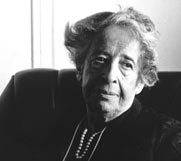
FAQ About Hannah Arendt

Who was Hannah Arendt?
Hannah Arendt was a renowned political theorist and philosopher known for her extensive works on the nature of power, totalitarianism, and democracy. Born in 1906 in Germany, she fled the Nazi regime and eventually settled in the United States. Her influential books include 'The Origins of Totalitarianism,' 'The Human Condition,' and 'Eichmann in Jerusalem.' Her ideas continue to stimulate academic and public discourse on political ethics and justice.

What is Hannah Arendt’s book 'The Origins of Totalitarianism' about?
'The Origins of Totalitarianism,' published in 1951, is one of Hannah Arendt's most significant works. The book explores the roots and rise of totalitarian regimes, focusing on Nazi Germany and Stalinist Russia. Arendt analyzes the characteristics of totalitarian movements and the dynamics of power, propaganda, and ideology. Her examination includes how such regimes employ terror and the erosion of civil liberties to maintain control.

How did Hannah Arendt define totalitarianism?
Hannah Arendt defined totalitarianism as a form of government that seeks total control over every aspect of public and private life, using propaganda, mass surveillance, and state terror. According to Arendt, totalitarian regimes are characterized by their ideologies which claim to explain everything under one singular perspective, often aiming to transform human nature itself. Examples of such regimes in her work include Nazi Germany and the Soviet Union under Stalin.

What was the controversy surrounding her book 'Eichmann in Jerusalem'?
Hannah Arendt's book 'Eichmann in Jerusalem: A Report on the Banality of Evil,' published in 1963, generated significant controversy. Arendt reported on the trial of Adolf Eichmann, a major organizer of the Holocaust, and introduced the concept of 'the banality of evil.' She argued that Eichmann was not a fanatic or sociopathic bureaucrat but an ordinary person who simply followed orders without much thought to their moral implication. Her portrayal led to debates on the nature of evil and personal responsibility in genocidal acts, stirring both support and criticism.

What is the concept of 'the banality of evil'?
The concept of 'the banality of evil,' coined by Hannah Arendt in her book 'Eichmann in Jerusalem,' suggests that evil can manifest in ordinary, mundane ways. It posits that people may commit heinous acts not out of deep-seated malice but through unthinking compliance and acceptance of authority. Arendt developed this idea while observing the trial of Adolf Eichmann, where she saw him as a mediocre person who committed terrible acts by following orders without critical thought.

What are some themes discussed in 'The Human Condition'?
'The Human Condition,' published in 1958, explores the fundamental facets of human activity in the context of political, philosophical, and social life. Some key themes include the distinction between labor, work, and action, the public and private realms, and the implications of modern science and technology on human existence. Arendt examines how these activities define human experience and contribute to our understanding of personal and collective identities.

How does Hannah Arendt view the role of philosophy in politics?
Hannah Arendt viewed philosophy as a crucial tool for understanding and interpreting political realities. She believed that philosophical inquiry can offer profound insights into political power, governance, and ethical conduct. However, Arendt also warned against the dangers of abstract philosophical theories when applied dogmatically to political life, advocating instead for reflective, critical thinking that considers the nuances of human experience and practical realities.

What did Hannah Arendt mean by 'vita activa'?
'Vita activa,' or 'the active life,' is a central concept in Hannah Arendt's work, particularly in 'The Human Condition.' It refers to a life dedicated to human activities, including labor, work, and action. Arendt differentiates these activities as follows: labor fulfills biological needs, work creates artifacts and structures, and action pertains to political engagement and interaction within a public space. She argues that these activities define the human experience and political life.

How did Hannah Arendt influence contemporary political thought?
Hannah Arendt profoundly shaped contemporary political thought through her analyses of totalitarianism, authority, and the nature of evil. Her insights into political power, civil rights, and the moral responsibilities of individuals in society remain relevant today, influencing scholars and policy-makers alike. Her ideas encourage deep reflection on democratic practices, human rights, and the complex interactions between citizens and state authority.

What is the significance of Arendt’s concept of the 'public realm'?
Hannah Arendt's concept of the 'public realm,' introduced in her work 'The Human Condition,' is significant for understanding political life and human interaction. The public realm is a space where individuals come together to collectively discuss, deliberate, and make decisions on common affairs. It contrasts with the private realm, where personal needs and concerns are addressed. Arendt highlights the importance of the public realm as essential for participatory democracy, enabling citizens to express opinions, engage in political debate, and contribute to community life.

Did Hannah Arendt write about the American Revolution?
Yes, Hannah Arendt wrote about the American Revolution in her book, 'On Revolution,' published in 1963. She examines the American Revolution alongside the French Revolution, analyzing their distinct political and ideological trajectories. Arendt praises the American Revolution for establishing a tradition of constitutional government and a framework for participatory democracy, contrasting it with the French Revolution, which she believed was trapped in theoretical ideals without achieving lasting political stability.

What is the relationship between freedom and politics according to Arendt?
Hannah Arendt considered freedom to be the essence of politics, where political engagement and public action provide individuals with the ability to make meaningful choices and influence societal outcomes. In her view, freedom is not simply the absence of constraints but rather the active participation in political life, characterized by debate, decision-making, and collective action. Arendt emphasized that true freedom is realized in the public realm, where individuals coexist with others and contribute to shaping the community.

What are Arendt's views on authority and power?
Hannah Arendt distinguished between authority and power in her political theory. She viewed authority as legitimate power exercised by institutions and leaders based on tradition, law, or moral consensus, whereas power is rooted in the collective will of a community or group. Arendt argued that authority is essential for maintaining social cohesion and political order, but it must be distinguished from authoritarianism, which imposes control through coercion and fear. Power, in her view, is more fragile as it relies on group consensus and cooperation.

Did Hannah Arendt believe in natural rights?
Hannah Arendt was critical of the concept of natural rights as traditionally understood. She argued that history had shown that natural rights, when not backed by a political structure, failed to protect people. In her book 'The Origins of Totalitarianism,' she discussed the plight of stateless persons and how the absence of a governing framework left them without rights. Arendt advocated for a political and legal framework to ensure and protect human rights, emphasizing the need for a community where rights are recognized and safeguarded.

What is Arendt’s criticism of modern science and technology?
Hannah Arendt raised concerns about modern science and technology, particularly regarding their impact on human values and political life. In 'The Human Condition,' she warned that unchecked technological advancements could lead to alienation and depersonalization, eroding the qualities that make us distinctly human. Arendt emphasized the importance of critical thought and ethical considerations in guiding scientific and technological progress to ensure they enhance rather than diminish human freedom and responsibility.

How did Hannah Arendt's personal experiences influence her work?
Hannah Arendt's personal experiences profoundly influenced her work. Witnessing the rise of Nazism, fleeing Germany, and experiencing life as a refugee deeply impacted her perspective on political systems, power, and human rights. Her engagement in intellectual circles and academic institutions across Europe and the United States enriched her understanding of different cultural and political environments, informing her analyses of totalitarian regimes, democratic governance, and the human condition.

What are the key differences between Arendt’s and Marx’s views on politics?
While both Hannah Arendt and Karl Marx engaged with the nature of politics and society, their approaches were significantly different. Arendt criticized Marx for his economic determinism and focus on labor as the primary aspect of human life. Instead, she emphasized political action, civic engagement, and the role of the public sphere. Marx's vision of a proletarian revolution and class struggle contrasts with Arendt's idea of political freedom achieved through dialogue and collective action in a democratic context.

Did Hannah Arendt identify as a feminist?
Hannah Arendt did not identify herself explicitly as a feminist, nor did she engage directly with feminist theory in her work. However, some of her ideas concerning the human condition, political participation, and authority resonate with feminist concerns. Arendt’s analyses often emphasize the role of the public sphere and collective action, which align with feminist critiques of hierarchical power structures, though her works focus more broadly on universal human experiences rather than gender-specific issues.

What role does storytelling play in Arendt’s political thought?
Storytelling in Hannah Arendt's political thought is a means to understand and communicate human experiences and historical events. Arendt believed storytelling allows people to make sense of the world, building a shared understanding of reality. In her view, narratives can help preserve the memory of past actions, aid in interpreting political events, and promote empathy and human connectivity. Arendt emphasized the power of storytelling in both public discourse and individual reflection to reveal truths and foster democratic engagement.

Why is Hannah Arendt relevant today?
Hannah Arendt remains relevant today due to her profound insights into the dynamics of power, authority, and human rights. Her work continues to provoke discussion on totalitarianism, the nature of evil, and the value of participatory democracy, especially in light of current global political challenges. Arendt's emphasis on critical thinking, public engagement, and ethical responsibility encourages ongoing dialogue about the principles that guide contemporary political practices and the preservation of democratic institutions.
